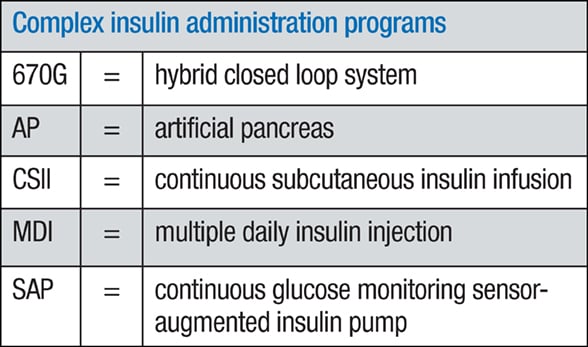Sept. 15, 2018
Among the various types of diabetes, type 1 diabetes is the most common type to be associated with complete or near complete lack of endogenous insulin secretion and require a basal-bolus insulin therapy program. Such insulin delivery could be achieved either through multiple daily insulin injection (MDI) or an insulin pump.
Basal-bolus insulin therapy programs

Basal-bolus insulin therapy programs
Basal-bolus insulin programs significantly impact daily life for patients with type 1 diabetes, unless blood glucose is measured frequently and insulin delivery is modified to respond to changes in glucose status.
MDI or insulin pump therapy guided by conventional blood glucose meters was implemented in the Diabetes Control and Complications Trial, which demonstrated that improved glycemic control was associated with decreased target organ damage. Trial results were published in the New England Journal of Medicine in 1993. However, the therapy was associated with glucose variability with daily hyperglycemia and hypoglycemia. Thus, unless blood glucose is measured frequently and insulin delivery is modified to respond to changes in glucose status, the basal-bolus insulin programs significantly impact daily life for patients with type 1 diabetes.
Yogish C. Kudva, M.B.B.S., an endocrinology consultant at Mayo Clinic's campus in Rochester, Minnesota, says: "The development and maturation of continuous glucose monitoring to provide real-time glucose measurements every five minutes, the development of insulin pumps and insulin analogs, and the acceleration in the speed of computing have all combined to make an artificial pancreas (AP) that is capable of 24/7 modulation of insulin delivery a practical solution for patients with type 1 diabetes.
"In 2005, the Food and Drug Administration (FDA) established a critical pathway for approval of therapies for type 1 diabetes. The critical pathway mechanism empowered the FDA to work with sponsors to develop clinical trials of experimental therapies with the aim of expediting approval. Through this pathway, the low-glucose insulin suspend system (530G) manufactured by Medtronic was approved by the FDA in September 2013 — just 90 days after submission of the application.
"The next significant development in the field was the FDA approval of the hybrid closed loop system (670G) in September 2016. This system was also approved 90 days after submission of the application. The trial involved 124 people and was a single-arm three-month study. The study showed an 8.2 percent increase in time spent in target glucose range (70 to 180 mg/dL) and 44 percent and 11 percent respective decrease in times spent in the hypoglycemic and hyperglycemic ranges. However, simultaneous with the approval, the FDA encouraged conduct of a randomized clinical trial to test the 670G system."
Medtronic is currently conducting a multicenter randomized trial that will involve more than 1,100 patients at about 30 clinical centers, most in the U.S. and some abroad. Patients from three different cohorts (listed below) will be randomized to use the 670G AP system or persist with their current therapy:
- Continuous subcutaneous insulin infusion (CSII)
- Continuous glucose monitoring sensor-augmented insulin pump (SAP)
- Multiple daily insulin injection (MDI)
Dr. Kudva comments: "Mayo Clinic in Rochester, Minnesota, is a site for this study and is currently enrolling patients. The trial will seek to demonstrate superior glucose control compared to the control arms. The MDI cohort has not started patient enrollment. Trial duration will be six months. Following their participation, patients can enter an extension phase. Details of this period are being developed at this time.
The NIH has funded four academic center-industry partnerships to develop more AP options for patients with type 1 diabetes. Dr. Kudva explains: "Of the four partnerships, the University of Virginia effort is currently the most advanced. This consortium will conduct a randomized controlled trial that will use the Dexcom G6 CGM System integrated with the Tandem t:slim X2 insulin pump. The trial will randomize 168 patients at seven medical centers in the U.S. to SAP or the Tandem AP system with Basil-IQ technology. Enrollment started in July 2018. Patients enrolled can be on SAP, CSII or MDI. Following a run-in period that will be of variable duration depending on patient characteristics, patients will be randomized on a 2-to-1 basis to six months of AP or SAP. Following their participation, patients can enter an extension phase.
"This randomized controlled trial seeks to show superior glucose control with the AP system. The advantages for patients seeking enrollment include free access to advanced therapeutic technology, guaranteed supplies for the duration of the study, engagement with the study team and active participation in the research process with the ability to provide feedback to improve the patient-oriented features of the system. A negative factor for those who participate in this study would be the time spent during research visits."
Dr. Kudva continues: "At Mayo Clinic, we are also initiating studies aimed at developing the next-generation AP that will include nonglucose signals impacting glucose control such as physical activity and emotional stress. Such data will be captured during a state-of-the-art AP study of nine weeks duration. This study is expected to start in December 2018. Subsequently, we hope to conduct clinical trials of the next-generation AP systems. This is an exciting time for therapeutic device development for type 1 diabetes. Mayo Clinic in Rochester, Minnesota, is delighted to be an active site in this clinical therapeutic research space."
For more information
The Diabetes Control and Complications Trial Research Group. The effect of intensive treatment of diabetes on the development and progression of long-term complications in insulin-dependent diabetes mellitus. New England Journal of Medicine. 1993;329:977.
Clinical trials. Medtronic Diabetes. Multi-center Trial in Adult and Pediatric Patients With Type 1 Diabetes Using Hybrid Closed Loop System at Home. Mayo Clinic.